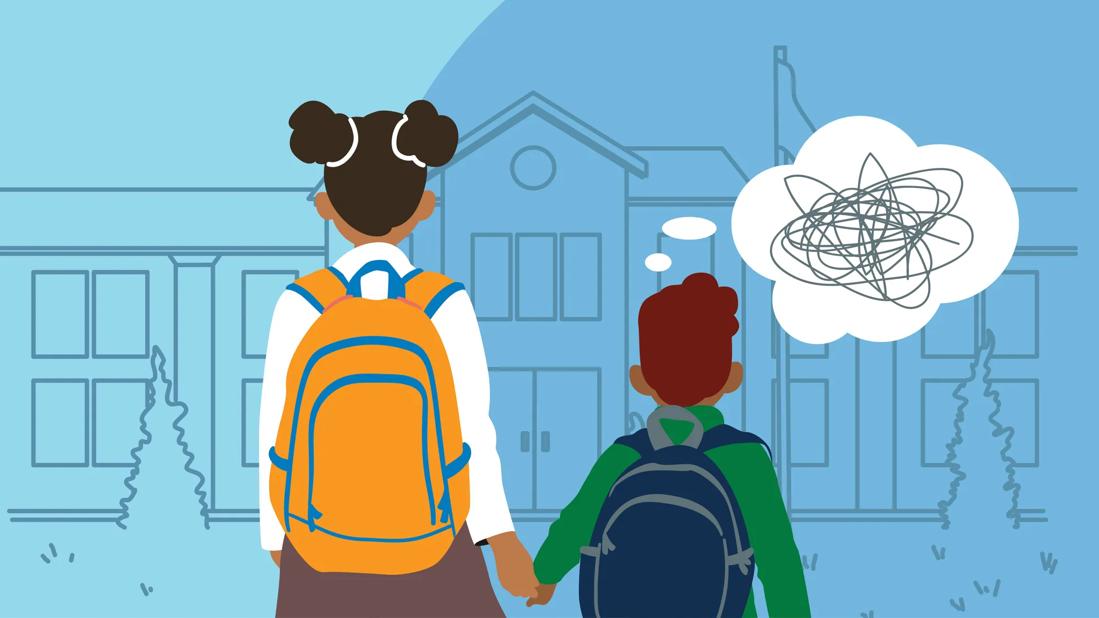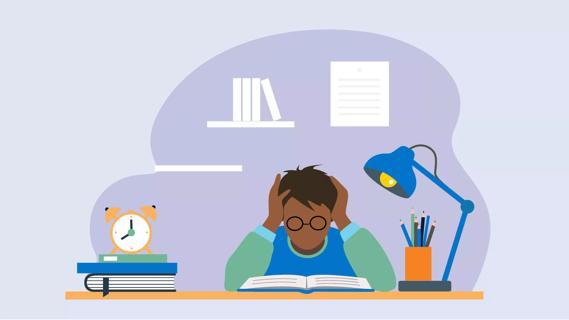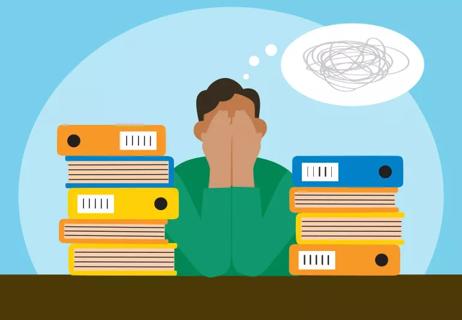School can be stressful, even anxiety-provoking — get to the root of the concern and enlist help when needed

The academic, social, emotional and mental strain of school can be stressful. Whether it’s a kindergartener dealing with playground conflicts or a high school junior juggling the demands of AP chemistry and theater rehearsals while grieving a breakup, the school years are a whirlwind of learning new skills.
Advertisement
Cleveland Clinic is a non-profit academic medical center. Advertising on our site helps support our mission. We do not endorse non-Cleveland Clinic products or services. Policy
It’s normal for kids to have a certain amount of nervousness about school and the stressors that lurk in cafeterias, study halls and locker rooms.
Left unmanaged, those concerns can grow into school anxiety and even school avoidance.
Luckily, there are steps you can take to help keep it from getting to that point — and support systems to turn to if it does.
We talked with pediatrician Ellen Rome, MD, and psychiatrist Joseph Austerman, DO, about how to support a child who’s coping with school anxiety — including signs it’s time to get help from a professional.
Occasional nervousness about school is one thing. Fear, anxiety and outright avoiding school is another.
“School refusal” or “school avoidance” are the terms used to describe when children’s anxiety keeps them from attending school on a regular basis. Some reports estimate that up to 15% of school-aged children experience school avoidance or don’t attend school regularly due to emotional distress.
Signs your child may be experiencing school-related stress and school avoidance include:
Advertisement
If that sounds all too familiar, you’ve come to the right place. Dr. Rome shares advice for how to help your child navigate school anxiety.
Having regular conversations about what’s going on at school can help identify what might be contributing to your child’s anxiety. That might include things like:
Asking specific questions can help you understand more about your child’s day and identify pain points. You’ll typically learn more if you ask pointed questions rather than a generic one, like, How was your day?
Dr. Austerman suggests some ways to frame a productive conversation:
When you better understand what’s working and what’s not, you can help come up with appropriate solutions.
“Many times, people are quick to think their child may benefit from medication when they experience school-related stress and anxiety. And some kids do,” Dr. Austerman acknowledges. “But the first step is to look for what’s triggering their anxiety. If the child is being bullied, for example, medication won’t fix anything.”
Use family dinners or conversations in the car to encourage positive behaviors and reinforce your family’s values.
You can ask about what they did to be kind that day. Or an act of kindness that they witnessed. And share your moments of kindness.
Similarly, you can ask what they were most proud about that day and share something you were proud about. Thinking along these lines can help build your child’s self-esteem.
You can also ask about something they failed at and what they learned. Reinforce that we all have these moments, and share your own experience with failure.
“These conversations can help kids recognize that failure is a time for growth, not an endpoint,” Dr. Rome states. “Asking 'what-if' questions can also encourage discussion and promote values the parents want to share.”
Proper sleep is critical to our ability to manage stress and regulate our emotions.
For you, sleep deprivation might mean having a shorter fuse when that one co-worker drones on (and on and on) in your meeting.
For your kids, too little sleep can make it tougher to listen in class, navigate dicey social interactions and remember to do their homework. In short, sleepiness can up the anxiety factor.
How much sleep your child needs will vary. But in general:
Advertisement
Some kids may need more sleep than that. If your child has difficulty waking in the morning, has trouble concentrating in school or has difficulty regulating their emotions, more ZZZs could do the trick.
Dr. Rome offers these sleep hygiene tips:
We can’t all be morning people. And gearing up for the day can be hard for a lot of people.
For some kids and families, mornings are the most challenging time. And chaotic mornings can feed school anxiety and contribute to school avoidance.
You can help set your child up for success by working with them to eliminate obstacles that keep them from starting their day on a good note.
Advertisement
If your child is consistently showing signs of school anxiety, tapping into their school support people can make a big difference. Their teacher(s), principal or school counselor can be a partner in supporting them.
“Establishing communication with teachers and other people at school helps create a support system for your child,” Dr. Austerman says.
Ask about signs of anxiety your child is showing at school. And offer them insight about what you’re seeing.
“For example, you might explain to their teacher, ‘If my kid seems like he’s tuned out, calling him out can make him more anxious. Here’s what has worked for us to help him tune in,’” Dr. Rome illustrates.
Working with their teacher and others, you may be able to ask for some support measures to help your child’s stress. For some kids, that may be things like:
Most kids have periods of time when they resist going to school. That’s normal. But if the behavior continues for two weeks or longer, it’s likely more than a passing phase. It’s time to get help.
“If you see a difference in your child’s behavior, don’t minimize it — explore it,” Dr. Austerman advises. “It’s going to be better for your child if you seek help for their concerns before they build into something bigger.”
Advertisement
Your first step is to find a qualified therapist who specializes in treating children. If you don’t know where to start, try reaching out to your child’s pediatrician or other healthcare provider.
Your child’s therapist may use several techniques to get to know your child, understand their concerns and work toward a solution. That may include elements like:
There’s no doubt that school can be stressful. But it doesn’t have to be overwhelming. Open up the lines of communication with your child and their school. And don’t hesitate to talk with a healthcare provider who can help your child manage their anxiety.
Learn more about our editorial process.
Advertisement

Preschool age is typically between 3 and 5 — but readiness may matter more

Asking questions, creating routines and setting schedules can help get students back on track

All states require DTaP, MMR, polio and chickenpox vaccines — healthcare providers recommend others, too

A well-balanced lunch should include a protein, whole grain, fruit and vegetables, and a healthy snack

‘Active shooter’ exercises may raise both awareness and anxiety

Focus on a positive mindset, strong study habits and healthy living

Vomiting and fevers are a hard no — other symptoms are a judgment call

College is a time of big transitions, intense stress and major lifestyle changes

Wearing a scarf, adjusting your outdoor activities and following your asthma treatment plan can help limit breathing problems

Your diet in the weeks, days and hours ahead of your race can power you to the finish line

When someone guilt trips you, they’re using emotionally manipulative behavior to try to get you to act a certain way